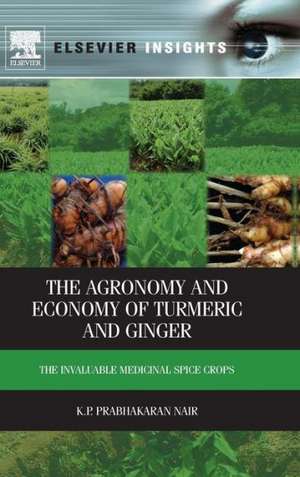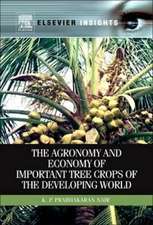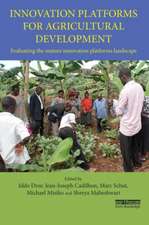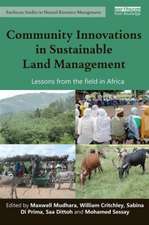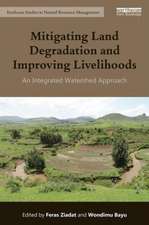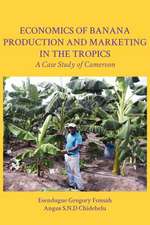The Agronomy and Economy of Turmeric and Ginger: The Invaluable Medicinal Spice Crops
Autor K.P. Prabhakaran Nairen Limba Engleză Hardback – 13 mar 2013
This book is intuitively organized by plant and use, allowing quick access to information. It puts the uniquely Indian use and history of turmeric and ginger plants into a global context of production and economic aspects. It explores the plants from a botanical perspective, and goes into details of their chemical composition as well. Rounding out the book are chapters on disease and pest control issues.
The book is a valuable resource for those involved in the production and marketing of these plants, as well as those looking for more information on the medicinal and nutritional properties of turmeric and ginger.
- The first book to bring together extensive information about turmeric and ginger
- Incorporates medicinal, nutritional and agricultural aspects of the two plants
- Offers a global perspective
Preț: 575.61 lei
Preț vechi: 747.03 lei
-23% Nou
Puncte Express: 863
Preț estimativ în valută:
110.14€ • 115.61$ • 91.42£
110.14€ • 115.61$ • 91.42£
Carte tipărită la comandă
Livrare economică 03-17 aprilie
Preluare comenzi: 021 569.72.76
Specificații
ISBN-13: 9780123948014
ISBN-10: 0123948010
Pagini: 544
Dimensiuni: 152 x 229 x 30 mm
Greutate: 0.89 kg
Ediția:New.
Editura: ELSEVIER SCIENCE
ISBN-10: 0123948010
Pagini: 544
Dimensiuni: 152 x 229 x 30 mm
Greutate: 0.89 kg
Ediția:New.
Editura: ELSEVIER SCIENCE
Public țintă
Students and researchers in agriculture, industry, policy planners and those involved in global pharmacopoeia.Cuprins
1: Historical Perspectives, Origin and History, Area and Production and Global Scenario
2.Genetics of Turmeric, Conservation and Management of Genetic Resources, Protection of Plant Varieties
3.The Botany of Turmeric, Origin and Distribution, Taxonomy , Morphology and Cytology, Turmeric Improvement, through Mutation and Hybridization
4: The Chemistry of Turmeric: Turmeric Oil, Turmeric Oleoresin, Volatiles, Microencapsulation, Turmeric Turmerones, Curcuminoids, Biosynthesis of Curcuminoids
5: The biotechnology of Turmeric
6: Agronomy of Turmeric: Soil and climate, Propagation, Planting, Cropping system, Harvesting, Storage of seed rhizome
7: Nutrition and Nutrient management in Turmeric: Soil tests and nutrient availability, nutrient requirement and uptake, inorganic fertilization, organics, Biofertilizers, Role of Growth regulators
8: Turmeric Entomlogy: The chapter deals with insect pests and their control in turmeric production
9: Turmeric Nematology: The chapter discusses various nematodes which attack turmeric and their control measures
10: Major diseases of Turmeric
11: Post Harvest Management
12: Nutraceutical Properties of Turmeric
13: Ornamental Curcuma
14: Turmeric in Ayurveda
2.Genetics of Turmeric, Conservation and Management of Genetic Resources, Protection of Plant Varieties
3.The Botany of Turmeric, Origin and Distribution, Taxonomy , Morphology and Cytology, Turmeric Improvement, through Mutation and Hybridization
4: The Chemistry of Turmeric: Turmeric Oil, Turmeric Oleoresin, Volatiles, Microencapsulation, Turmeric Turmerones, Curcuminoids, Biosynthesis of Curcuminoids
5: The biotechnology of Turmeric
6: Agronomy of Turmeric: Soil and climate, Propagation, Planting, Cropping system, Harvesting, Storage of seed rhizome
7: Nutrition and Nutrient management in Turmeric: Soil tests and nutrient availability, nutrient requirement and uptake, inorganic fertilization, organics, Biofertilizers, Role of Growth regulators
8: Turmeric Entomlogy: The chapter deals with insect pests and their control in turmeric production
9: Turmeric Nematology: The chapter discusses various nematodes which attack turmeric and their control measures
10: Major diseases of Turmeric
11: Post Harvest Management
12: Nutraceutical Properties of Turmeric
13: Ornamental Curcuma
14: Turmeric in Ayurveda
Recenzii
"This volume examines the spice crops of turmeric and ginger. It delves into the origin, history, botany, genetics, chemistry, biotechnology, agronomy, nutrition and nutrient management, entomology, nematology, diseases, harvesting and postharvest management, and nutraceutical properties…" --Reference and Research Book News, August 2013
